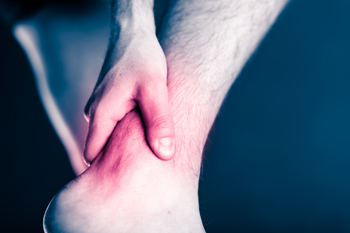
Achilles tendonitis is an injury of the long tendon at the back of the heel. It is usually the result of overuse, but there are many other causes, including overpronation, incorrect footwear, and wearing high heels. Symptoms of acute Achilles tendonitis include pain and stiffness in the area of the Achilles tendon. Pain is normally felt when first waking up, but is likely to diminish as the tendon warms up. Pressing in or squeezing from the sides evokes tenderness, and a nodule or lump may be felt in the tendon. Many of these symptoms also appear in chronic tendonitis, but they can become worse during exercise. Further, walking uphill or up stairs may cause pain. These are warning signals that Achilles tendonitis may be more serious, and if ignored the Achilles tendon could rupture. A chiropodist can determine the severity of Achilles tendonitis through an MRI or ultrasound scan. There are a number of ways to treat Achilles tendonitis, but getting treatment quickly is extremely important. Please see a chiropodist for further information about treatment options.
Achilles tendonitis is a common injury of the Achilles tendon, a band of fibrous tissue that runs along the back of the lower leg. The Achilles tendon can also rupture, making it impossible to lift the foot. If you are suffering from heel or calf pain, please consult with Chiropodist Stephanie Poupore from North Bay Foot & Ankle. Our clinician can help you maintain the health of your lower limbs and your mobility.
Causes of Achilles tendon injuries include:
-
Repetitive stress or overuse
-
Sudden increase in activity levels
-
High impact injury
-
Calf muscle tightness or weakness
-
Altered foot biomechanics
-
Heel bone spurs
-
Underlying medical conditions that weaken the tendon
Symptoms of an Achilles tendon injury include:
-
Heel and calf pain that worsens following exercise
-
Chronic heel and calf pain
-
Sudden pain in the back of the ankle or calf
-
A popping or snapping sensation
-
Thickened lump in the Achilles tendon
-
Ankle and calf stiffness
-
Decreased range of motion in the affected foot
-
Swelling
-
Difficulty walking
Treatment
-
Resting the affected leg
-
Applying ice
-
Compressing the foot and ankle
-
Elevating the injured leg
-
Wearing orthotics
-
Low impact exercises
-
Stretches
-
Strengthening exercises
-
Non-steroidal anti-inflammatory medications
-
Cortisone injections
-
Surgery, if the tendon is ruptured
Achilles tendon injuries can be very painful and lead to reduced mobility if left untreated. If you have any questions, please feel free to contact our office located in . We offer the newest diagnostic and treatment technologies for all your foot care needs.
